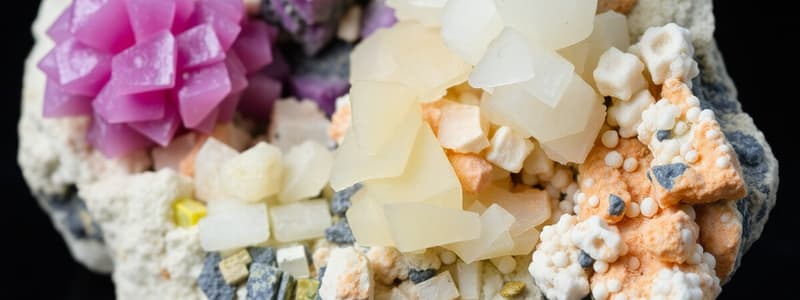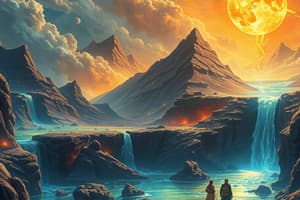Podcast
Questions and Answers
What process involves the interaction of hot water with minerals?
What process involves the interaction of hot water with minerals?
- Biogeochemical cycling
- Volcanic activity
- Weathering
- Hydrothermal alteration (correct)
What is the main focus of geochemistry?
What is the main focus of geochemistry?
- The biological interactions within ecosystems
- The physical structure of the Earth
- The chemical processes and composition of the Earth (correct)
- The geological history of Earth
Which isotopes are primarily used for understanding geological age?
Which isotopes are primarily used for understanding geological age?
- Stable isotopes only
- Both stable and radioactive isotopes
- Radioactive isotopes only (correct)
- Isotopes have no relevance in geology
Which technique involves analyzing light spectrums to determine material composition?
Which technique involves analyzing light spectrums to determine material composition?
Which cycle describes the movement of nitrogen in biological systems?
Which cycle describes the movement of nitrogen in biological systems?
What is a significant application of environmental geochemistry?
What is a significant application of environmental geochemistry?
Which process is NOT considered a part of geochemical cycles?
Which process is NOT considered a part of geochemical cycles?
What do geochemical maps primarily represent?
What do geochemical maps primarily represent?
Flashcards are hidden until you start studying
Study Notes
Geochemistry in Geology
-
Definition: Geochemistry combines principles of chemistry and geology to study the chemical composition of the Earth and its processes.
-
Key Concepts:
- Elements and Compounds: Focus on the distribution and behavior of elements (e.g., silicon, oxygen, iron) in geologic materials.
- Mineral Composition: Study of minerals to determine their chemical makeup and the processes of formation.
- Stable and Radioactive Isotopes: Used for dating rocks and understanding the age of geological formations.
-
Processes:
- Weathering: Breakdown of rocks and minerals through chemical reactions, affecting soil and sediment composition.
- Hydrothermal Alteration: Interaction of hot water and minerals altering their chemical and physical properties.
- Biogeochemistry: Interactions between biological processes and geochemical cycles, including nutrient cycling.
-
Applications:
- Resource Exploration: Identifying and assessing mineral and hydrocarbon resources.
- Environmental Geochemistry: Examining the impact of human activities on the natural geochemical cycles.
- Geochemical Modeling: Predicting the behavior of elements and minerals under various conditions.
-
Techniques:
- Spectroscopy: Analyzing the light spectrum emitted or absorbed by substances to determine their composition.
- Chromatography: Separating chemical mixtures to identify and quantify specific compounds.
- Mass Spectrometry: Measuring the mass-to-charge ratio of ions to ascertain elemental and isotopic compositions.
-
Geochemical Cycles:
- Carbon Cycle: Involves the movement of carbon among the atmosphere, oceans, soil, and living organisms.
- Nitrogen Cycle: Describes nitrogen's transformation and its role in biological systems.
- Silicon Cycle: Explores the movement of silicon through weathering, biological uptake, and sedimentation.
-
Important Tools:
- Geochemical Maps: Spatial representations of geochemical data to identify patterns and anomalies.
- Analytical Software: Used for data analysis and interpretation of geochemical data.
-
Case Studies:
- Examining volcanic eruptions' geochemical signatures to understand magma evolution.
- Investigating groundwater chemistry to address contamination issues.
Understanding geochemistry is crucial for solving geological problems, assessing environmental impacts, and discovering natural resources.
Geochemistry Definition
- Studies the chemical composition of the Earth and its processes
- Combines principles of chemistry and geology
Key Concepts
- Focuses on the distribution and behavior of elements such as silicon, oxygen, and iron within geologic materials
- Studies mineral composition, including chemical makeup and formation processes
- Utilizes stable and radioactive isotopes for dating rocks and understanding the age of geological formations
Geochemical Processes
- Weathering: Breakdown of rocks and minerals through chemical reactions, influencing soil and sediment composition
- Hydrothermal Alteration: Interaction of hot water and minerals alters their chemical and physical properties
- Biogeochemistry: Examines the interaction between biological processes and geochemical cycles, including nutrient cycling
Geochemistry Applications
- Resource Exploration: Identifying and assessing mineral and hydrocarbon resources
- Environmental Geochemistry: Analyzing the impact of human activities on natural geochemical cycles
- Geochemical Modeling: Predicting the behavior of elements and minerals under various conditions
Geochemical Techniques
- Spectroscopy: Analyzes the light spectrum emitted or absorbed by substances to determine their composition
- Chromatography: Separates chemical mixtures to identify and quantify specific compounds
- Mass Spectrometry: Measures the mass-to-charge ratio of ions to ascertain elemental and isotopic compositions
Geochemical Cycles
- Carbon Cycle: Involves carbon movement among the atmosphere, oceans, soil, and living organisms
- Nitrogen Cycle: Describes nitrogen's transformation and roles in biological systems
- Silicon Cycle: Explores silicon movement through weathering, biological uptake, and sedimentation
Important Tools
- Geochemical Maps: Spatial representations of geochemical data to identify patterns and anomalies
- Analytical Software: Used for data analysis and interpretation of geochemical data
Case Studies
- Examining volcanic eruptions' geochemical signatures to understand magma evolution
- Investigating groundwater chemistry to address contamination issues
Studying That Suits You
Use AI to generate personalized quizzes and flashcards to suit your learning preferences.




